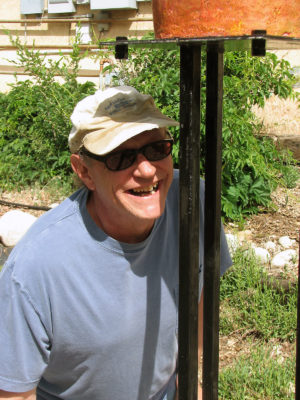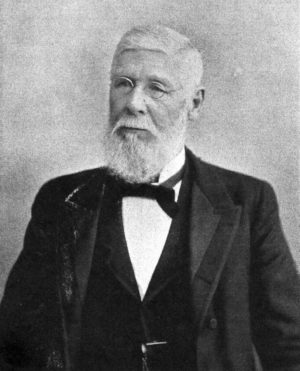By Daniel Smith
When offered the chance to write this column, I thought about the complexity of tracking Congress in general and a single representative in particular – aren’t they whirlwinds of activity, needing staff to keep tabs on their daily appointments?
I also thought about those millstones around many political reporters’ necks – legalese, political nomenclature, translating endless document babble, political hack spokespeople, form letters, “spin” and, well, bullroar.
I was not needlessly worried, I must say.
My assignment is to focus on Republican Doug Lamborn, representing our own Fifth Congressional District.
Yes, he of the rigid party loyalty, patriotism-drenched press releases, and who distinguished himself in 2011 with the “It’s like touching a tar baby” remark about working with President Obama – and later apologized.
Undaunted, we’ll begin to track the activities and accomplishments of Rep. Lamborn month to month – perhaps compared to other Colorado representatives.
Have no illusions – people in congress are busy, and have lots of activities and measures to juggle; but the voluminous writing, research, interaction with constituents and office work is shouldered by harried staff and party lawyers. Keeping in touch with your people is an imperative.
One of the first opportunities I had to wade in was a telephone town hall recently scheduled by the congressman after repeated attempts by some organizations to get him to break away from the so-conservative enclave in Colorado Springs and to come out to the central mountains where free spirits, level heads, irreverent humor, charity and yes, even liberal viewpoints are welcomed.
I signed up for the phone confab despite realizing critics of these types of verbal jousts say they allow screening of questions as well as critic’s calls, loading the audience with sympathizers, and other hijinks.
[InContentAdTwo]
The first sign of trouble was when the scheduled time of the call was moved at the last minute from 7 p.m. to 6:30. One of my friends in town was notified via email, I was not. The phone rang but once at 6:30, not even a second time. When I picked up the phone later, I discovered a recorded message from Doug stating something like “sorry to have missed you, but you can still call in and join in at xxx-xx-xxxx.” This was at least an hour after the session had ended.
I was left with unanswered questions on the reluctance to appear in person and some legislative questions about what’s been done lately to benefit the district.
So, I’ve undertaken, through the congressman’s website and elsewhere, including calling the district office, to discover what he’s been doing since, say, the calendar turned to 2017 and President Donald Trump sat down behind the oval office desk.
Research shows there are plenty of non-district-specific bills he has voted on. Some of those defy simple descriptions on objectives unless you read through the actual bill text, or find a site that spells out what that Gordian knot of legalese text actually means.
Admittedly cherry-picking a few noteworthy items, I submit the following:
Perhaps most notably, he sponsored H.R. 726 and H.R. 727, which would end all federal funds for the Corporation for Public Broadcasting, as well as National Public Radio. The $455 million allocated for these long-cherished institutions represents just a fraction of one percent of the overall budget, but Lamborn notes, “The federal government cannot sustainably fund every pop culture happy hour just for fun.”
His reasoning is we need responsible federal spending cuts and the private sector has the resources to keep CPB going. Heads of PBS would probably disagree. He also states that since most homes have TVs and internet access, it isn’t necessary to subsidize something that widely available – ignoring, apparently, the costs of providing that quality programming, “some of which I watch and enjoy,” he said. Lamborn introduced similar legislation on the CPB and NPR previously, in the 2011-2012 congressional session.
More recently, he introduced HR 524 in January to prohibit the use of tissue from an induced abortion for research conducted or supported by the National Institutes of Health on the transplantation of fetal tissue for therapeutic medical purposes. Soliciting or acquiring a donation of fetal tissue from an induced abortion for a purpose other than disposal would prohibited.
In January, Lamborn sponsored House Joint Resolution 16, which mirrors another bill (HJR 38) to nullify the Stream Protection Rule finalized by the Interior Department’s Office of Surface Mining Reclamation and Enforcement in December 2016 to minimize the impacts of surface coal mining operations and toxic waste on surface water, groundwater, and the productivity of mining operation sites. The other bill passed, and has become law.
Last fall, Lamborn introduced H.R. 6086, that would permit houses of worship to endorse political candidates, something churches and other 501(c)(3) nonprofits have technically been prohibited from doing for the past 60-plus years. Cleverly titled “Protect Religious Expression Against Censorship and Harassment” (PREACH), it seeks to allow endorsing political candidates from the pulpit – prohibited under threat of losing tax-exempt status by the (Lyndon) Johnson amendment dating back to 1954. Critics said the bill ignores the fact preachers and other nonprofit groups can talk about political issues from the pulpit, but not endorse or reject candidates.
Space doesn’t permit additional measures sponsored, co-sponsored or supported by the congressman this time, but stay tuned, we’ll obtain more information on items actually affecting the Fifth District and national policy legislation in his bailiwick in the near future. ?


